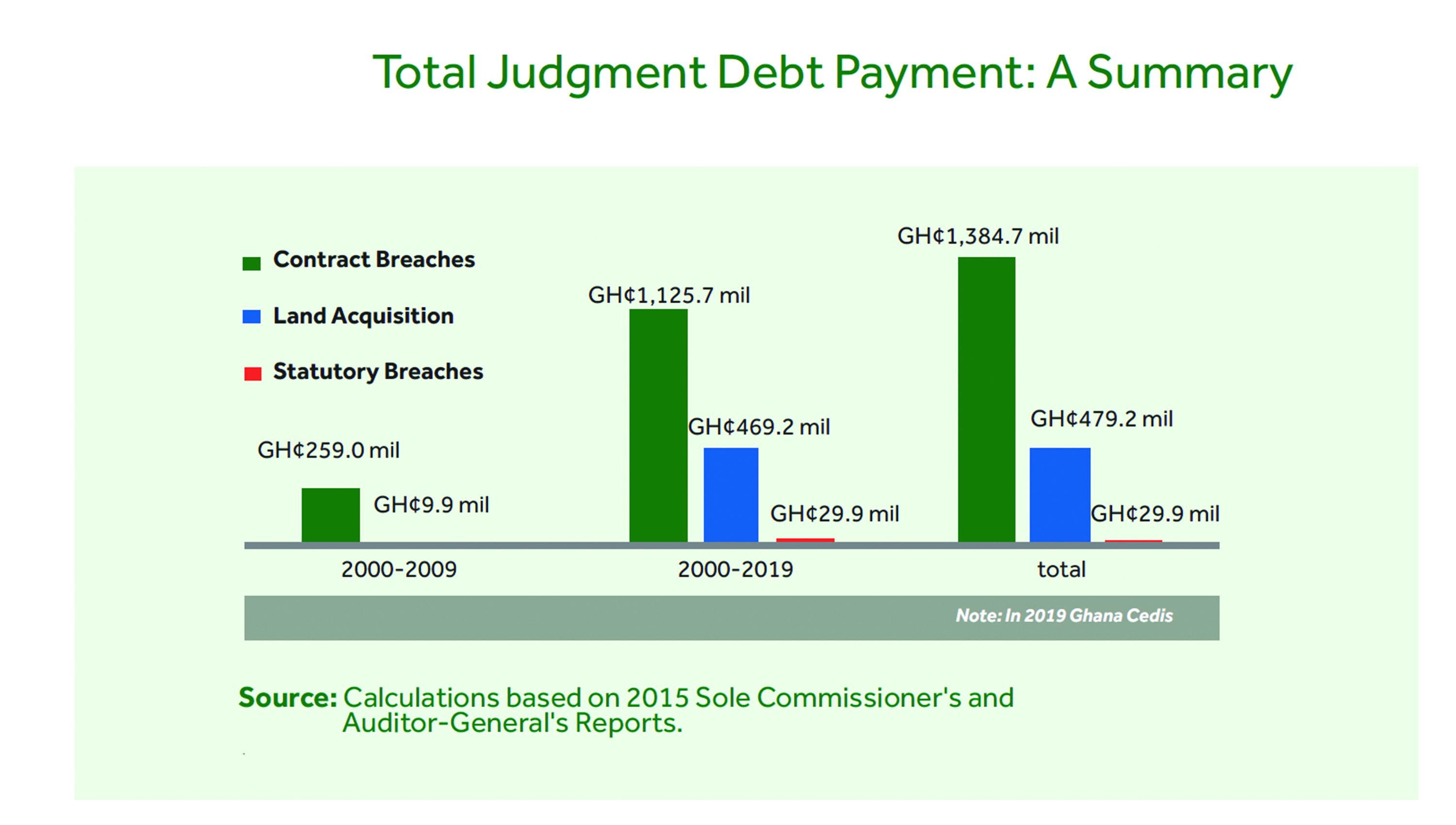
Judgment debt cause nation GH¢1.89bn in 20 years • OSP urged to investigate all cases
The Centre for Social Justice (CSJ) has urged the Office of the Special Prosecutor (OSP) to independently investigate all the cases of judgment debts in the Fourth Republic.
It said this should be done with the intent of establishing criminal liability of political office holders and public office holders and proceed accordingly to prosecute offenders.
This formed part of the CSJ’s recommendation in its latest report titled ‘A 20-year review of Judgement debt payments in Ghana: Impact, causes and remedies.
The report noted that judgment debt payments in the country continued to be a recurring issue in an economy currently saddled with rising public debt, persistent fiscal deficits, a high youth unemployment rate, and over 30 per cent of its population living in poverty
It noted that in equivalent 2019 Cedi terms, the total judgment debts paid from 2000 – 2019 amounted to GH¢1.89 billion, equivalent to about 135 per cent of new multilateral loans contracted by the government in 2019, 112 per cent of total central government grants received in 2019, and about 30 per cent of total health expenditures in 2019.
Advertisement
These judgment debts arose from alleged contractual breaches, failure to promptly pay compensations for compulsory land acquisitions by the state/government, and alleged tortuous/statutory breaches committed by public officials in the course of their public duties.
Of the total, judgment debt payments arising from contractual breaches was GH¢1.38 billion (73 per cent), GH¢479.2 million from failure to promptly pay compensation for compulsory land acquisition by the state/government million (25 per cent) and GH¢29.9 million (about 1.5 per cent) from tortuous/statutory breaches by public officials.
Trained lawyers
As part of its recommendations, the CSJ also urged the Attorney General to ensure that only trained or expert lawyers were allowed to prosecute cases.
It said the practice of sending lawyers who were either not aware of the case or ill prepared should cease.
“In the instance of lack of experienced lawyers, the office could outsource some of the work to those who have the competence to address the matter. A medium to long term plan to recruit and train more lawyers to support the Attorney General's Office should be considered,” it noted.
Reforms of key institutional arrangements
The CSJ also called for reforms of some key institutional arrangements in the execution of government business.
Some of the reforms include the enforcement of strict compliance to the national procurement laws to ensure that unauthorised deviations at all levels carry hefty consequences for the responsible public official(s).
The reforms must also ensure that qualified legal experts who understand the murky nature of contracts involving governments are engaged when committing to contractual obligations.
The CSJ also called for the need to review, enhance, and enforce international best practices in public financial management.
It said key stakeholders must always be engaged before any government enters into a contract with a private party on behalf of the state.
“In particular, ensuring all key stakeholders have oversight and input before execution of contracts.
“We also need to establish an inter-party framework for managing contractual obligations of government during and after political transitions. It is crucial that all stakeholders, regardless of political party affiliations, commit to minimising contractual breaches resulting from political transitions.
“In particular, the framework must ensure that stakeholders act in the collective interest and not in their self-interests,” the report indicated.
Bleeding from
judgment debts
In his foreword, the Chairman of the CSJ council, Dr Sodzi Sodzi-Tettey, noted that six years after Justice Yaw Appau’s sole judgment debt commission’s report, the country continued to bleed and suffocate from what he described as reckless stewardship of the national resources.
He said the most recent award of a judgment debt of US$170 million against the government of Ghana by the Arbitration Tribunal in the GPGC Ltd versus Government of Ghana case, and the spurious reasons adduced by Ghana’s legal counsel for non-compliance with timelines stipulated by the court, were particularly emblematic of how lightly the problem continued to be viewed.
“Clearly, the phenomenon of judgment debts is entrenched only because of negligence, blatant disregard for public procurement laws, illegal abrogation of contracts, and corrupt activities by public officials in their line of duty.
“Judgement debts are thus a tedious combination of weak and corrupt political leadership and bureaucracy and wanton disregard for the scarce resources of the people of Ghana, resources that could have built countless hospitals, affordable housing and schools,” he stated.

